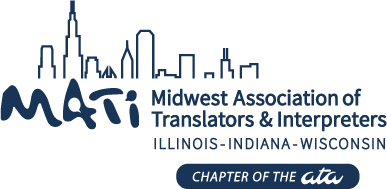The first of our Brown Bag Webinar Series for Medical Interpreters,
Speech Pathology and Medical Interpretation will be presented by Angela Luther, who is a Certified Healthcare Interpreter and has her Certificate of Clinical Competence in Speech-language Pathology.
Many interpreters are trained in practices for healthcare interpreting generally, but do not have specific training for speech-language pathology. While all ethical principles apply to speech-language pathology, the nuances of interpreting for a person with a communication and/or swallowing deficit can impact many factors in the interpreting encounter.
The presentation serves as a way to foster more collaboration between interpreters and speech-language pathologists. The presentation serves the following purposes:
· Give interpreters concepts and vocabulary for better communicating with speech-language pathologists.
· Briefly explain common treatments in speech-language pathology in the United States in comparison with other countries
· Explain expanding roles and positioning for interpreters during communication evaluations and treatment sessions.
· Explain rationale behind expanded interpreter roles in assessment and treatment.
· Give interpreters a format for scheduling collaboration time and explain expectations of many speech-language pathologists.
· Discuss practical applications of different formats outlined for collaboration.
Rationale
In my experience as a person in both roles, interpreters and speech-language pathologists have similar goals and understandings, but often lack the common vocabulary for effective collaboration. I have found that this is easily alleviated through the use of common vocabulary and expansion of common concepts.
I have also found that there are differing expectations of interpreters by the interpreters themselves and the speech-language pathologists. It is important to expose these differences to alleviate tensions that arise between the speech-language pathologists and interpreters. I cover the speech-language pathologists’ expectations assuming that most interpreters share similar role expectations.
I present a format for collaboration outlined by the American Speech-Language-Hearing Association in hopes of putting interpreters at the forefront of what is considered best practice for collaboration with interpreters in speech-language pathology. Not all speech-language pathologists will be well-versed in this newer model of collaboration and the interpreter can help promote best clinical practices.
Each webinar in this series will be 45-55 minutes long, followed by 5-15 minutes of Q&A. Webinars are $15 for MATI Members and $25 for Non-members.
Webinars shall be facilitated using GoToWebinar. Computer and internet access are required. Details on accessing the webinar will be emailed to registrants a few days before the webinar takes place.
Each Webinar is approved for 1 CEU through the ATA. Certificates will be awarded upon completion.
Were you unable to attend this webinar? For information on accessing a recording please email: matiemail@gmail.com.
